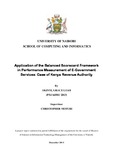| dc.description.abstract | Performance measurement is a prerequisite to e-Government efforts to audit services and assure citizens of the accountability of the government. This research sought to apply the Balanced Scorecard concept as a consistent tool in measuring and evaluating performance of an e-Government application by taking the case of Kenya Revenue Authority (KRA). An analysis was made on how this organization is developing performance measurement data, including customer satisfaction measures. A systematic study of the existing performance measurement tools was carried out in establishing the basis for conceptualizing the Information Systems Balanced Scorecard (IS-BSC framework). The researcher investigated various dimensions of e-Government services and proposed a performance measurement tool that will assess the quality and trust dimensions of the e-Government services from management‟s perspective. The proposed tool was validated by using the i-Tax service of KRA. The author then lists the indicators and metrics that can be used to measure the performance of e-Government services. This research suggests an adoption of an IS-BSC which measures and evaluates e-Government services from the following perspectives: business value, user orientation, internal process, and future readiness. The research concludes with recommendations to help the Kenyan government develop its own performance measurement mechanism to assess the impact of investing in e-Government. The findings of this study would be beneficial to various functional ministries adopting e-Government initiatives (G2G, G2C and G2B) as they would gain an understanding about the mixed method of using metrics in IT governance balanced scorecard. This will enhance strategic management of e-Government services. Similarly, the discussions and findings of the study would be important to conceptual development by other researchers and academicians while conducting future related studies. The results would be applied to draw an Information Systems Balanced Score Card as a tool for Strategic Management of e-Government services at KRA and evaluate its effects on performance.
Keywords: Balanced Scorecard, Performance Measurement; e-Government, e-Government Service; IS Strategic Management; Kenya Revenue Authority | en_US |

